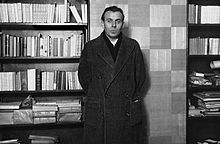Journey to the end of the night
Journey to the end of the night , original French title Voyage au bout de la nuit , is a 1932 novel by Louis-Ferdinand Céline .
content
The episode novel tells the story of Ferdinand Bardamu, who escaped the turmoil of the First World War and returned to Paris after stints in Africa and America, where he studied medicine, made his way as a poor doctor and finally became the acting head of a psychiatric facility on the outskirts. The tragic, unscrupulous figure of Léon Robinson appears again and again and gives the plot the decisive twists and turns. Bardamu's love affairs are assigned to the stations as characteristic female figures.
language
The novel draws its linguistic liveliness from the drastic use of verbal expressions, without restricting itself to direct speech. In Die Reise, Céline not only uses argot to characterize people, he goes further and uses it in the narrative text in addition to the entire spectrum of written language; where both are not enough for him, he shapes new creations. His first-person narrator blasphemes against sacred values of the grande nation such as patriotism , militarism and colonial glory as well as against hypocrisy , the fears of the petty bourgeoisie or the arrogance of the upper bourgeoisie - nothing goes unscathed. “The fact that Céline was not awarded the highly respected Prix Goncourt for the trip - contrary to what was initially reported - but instead the Prix Renaudot (which is only slightly less prestigious, but Céline nevertheless appeared as a consolation prize), had at least academic alienation in view of the linguistic one Freedoms and innovations to do that the author had afforded, ” wrote his translator Hinrich Schmidt-Henkel .
Translations
A translation that Isak Grünberg had done immediately after the French original was published on behalf of Piper Verlag was not published by the publisher because it did not meet the requirements, as Grünberg was told. The publication of a decidedly anti-heroic work no longer seemed opportune after Hitler came to power. Piper sold the German rights including the Grünberg translation to the Julius Kittl's successor (Mährisch-Ostrau / Leipzig), who published them in December 1933 so "mutilated, misshapen, falsified" that Grünberg published them, as he did in April 1934 in Klaus Mann's exile magazine Die Sammlung wrote no more than his recognized. Only four pages remained unchanged.
In 2003, the Rowohlt Verlag , which had already acquired the rights to Céline's work after the Second World War , published a new translation by Hinrich Schmidt-Henkel , which Ina Hartwig called "sensational" in the Frankfurter Rundschau. Otherwise, the most important German-language feature sections were consistently enthusiastic.
Dramatization
In 2013 , Frank Castorf staged the novel as a theatrical spectacle at the Munich Residenztheater .
expenditure
- Voyage au bout de la nuit . Denoël, Paris 1932 (French first edition).
- Journey to the end of the night. German by Hinrich Schmidt-Henkel. Rowohlt Verlag, Reinbek near Hamburg 2003 ISBN 3-498-00926-5
Secondary literature
- Rudolf von Bitter: 'A wild product': Louis-Ferdinand Céline and his novel Journey to the end of the night in German-speaking countries: A reception study . Romanistischer Verlag, Bonn 2007, ISBN 9783861431787 .
- Annie-Claude Damour and Jean-Pierre Damour: Louis-Ferdinand Céline, Voyage au bout de la nuit . Presses universitaires de France, Paris 1985, ISBN 9782130391456 .
- André Derval (Ed.): "Voyage au bout de la nuit" by Louis-Ferdinand Celine. Critiques 1932-1935. Imec, Paris 2005, ISBN 2264041684 (collection of contemporary reviews).
- Henri Godard: "Voyage au bout de la nuit" by Louis-Ferdinand Celine (Essai et dossier) . Gallimard, Paris 1991, ISBN 9782070383504 (= Foliothèque 2).
- Günter Holtus : Investigations into the style and conception of Celine's Voyage au bout de la nuit . Droz, Geneva 1972.
- Tchamy Kouajie: Langage and narration in "Voyage au bout de la nuit" and "Mort à credit" de Louis-Ferdinand Céline . Peter Lang, Frankfurt am Main 2014, ISBN 978-3-631-65160-5 .
- Till R. Kuhnle: Louis-Ferdinand Celine, "Voyage au bout de la nuit" 1932. in Wolfgang Asholt, Ed .: 20th century: Roman. Series and publisher: Stauffenburg Interpretation - French literature, Tübingen 2007 ISBN 978-3-86057-909-1 pp. 153-218
- Jean-François Lavis: Une écriture des excès: Analysis sociologique de Voyage Au Bout de La Nuit . Ed. Balzac-Le Griot, Montréal 1997, ISBN 2-9214-6808-5 .
- Tom Quinn: The Traumatic Memory of the Great War, 1914-1918, in Louis-Ferdinand Céline's Voyage au bout de la nuit . Edwin Mellen Press, Lewiston, NY 2005, ISBN 9780773459380 .
- Danièle Racelle-Latin: Le "Voyage au bout de la nuit" de Céline: Roman de la subversion et subversion du roman . Palais des Académies, Brussels 1988.
See also
Web links
- “The world sucks” , Mario Scalla in Friday , June 17, 2005
- Summary, evaluation of the first translation by Isak Grünberg, 1933
- Selection of reviews for the new translation from 2003 by perlentaucher .
